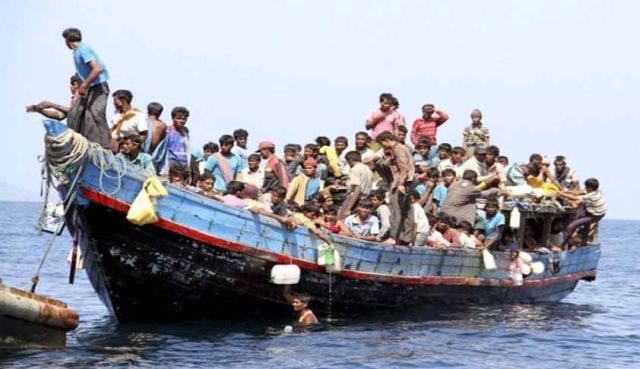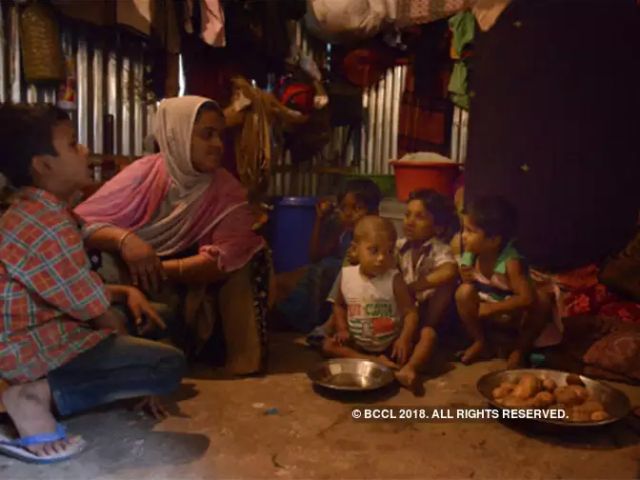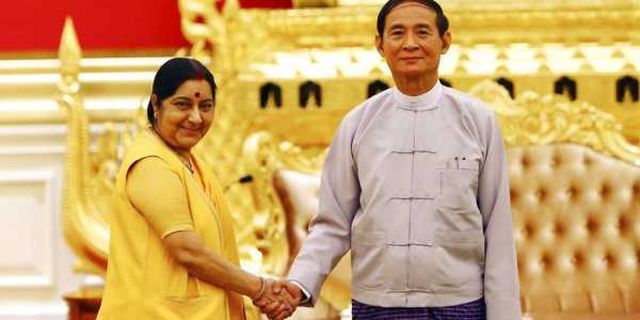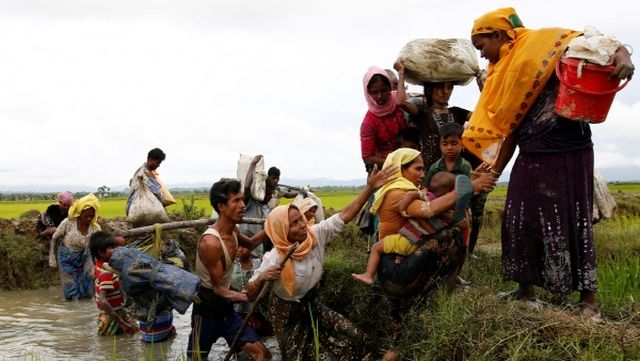
by Editor | May 25, 2021 | Muslim World
 By Sena Guler,
By Sena Guler,
Ankara: Rohingya organizations worldwide criticized on Sunday a new agreement signed between Myanmar and the UN on repatriation of Rohingya refugees, saying it did not touch the root causes of the crisis.
“We are deeply concerned that the MOU [Memorandum of Understanding] did not address the root causes of the Rohingya crisis, particularly the issue of Rohingya citizenship and ethnic identity,” said a joint statement signed by 23 Rohingya organizations, including the European Rohingya Council (ERC) and Arakan Rohingya National Organization (ARNO).
On June 6, the Myanmar government signed the agreement with the UN Development Programme (UNDP) and the UN Refugee Agency (UNHCR), allowing them to get involved in the much-delayed repatriation process.
The statement also voiced concern over not involving a refugee representative in the signing of the agreement, although Rohingya had the right to know about the deal on their repatriation.
“The texts of the MOU have not been made public leaving the international community in dark that calls into question,” it added.
“All previous records showed that the UN agencies, including UNHCR as the agent of the interest of the international community, could not provide adequate protection to the Rohingya returnees due to obstinacy of the Myanmar government,” it said.
‘Question of life and death’
“Repatriation is a life and death question for the whole Rohingya people.”
It added the Rohingya people were unwilling to return Myanmar as the authorities, which “engaged in genocide, war crimes and crimes against humanity”, had not changed their attitudes towards them.
“They could not trust the Myanmar government and military that have killed, raped, and starved them with hundreds of their villages razed, their land taken and homesteads bulldozed.”
It also called for international protection from state and regional actors and UN peace-keeping forces.
“Last but not least, there must be accountability and perpetrators of crimes must be brought to justice and referred to International Criminal Court (ICC),” it concluded.
Rohingya crisis
Since Aug. 25, 2017, more than 750,000 refugees, mostly children and women, have fled Myanmar and crossed into Bangladesh after Myanmar forces launched a crackdown on the minority Muslim community, according to Amnesty International.
At least 9,400 Rohingya were killed in Rakhine from Aug. 25 to Sept. 24 last year, according to Doctors Without Borders.
In a report published recently, the humanitarian group said the deaths of 71.7 percent or 6,700 Rohingya were caused by violence. They include 730 children below the age of 5.
The Rohingya, described by the UN as the world’s most persecuted people, have faced heightened fears of attack since dozens were killed in communal violence in 2012.
The UN documented mass gang rapes, killings — including of infants and young children — brutal beatings, and disappearances committed by security personnel.
In a report, UN investigators said such violations may have constituted crimes against humanity.
—AA

by Editor | May 25, 2021 | News

Rohingya refugees at a camp at Baruipur.
By Nikhil M. Babu,
New Delhi : After Mohammad Haroon turned 15, he began watching Bollywood movies, walking four kilometres to a theatre near his village in Myanmar.
Little did he know that the Hindi he learnt watching these films would one day help him settle down in a foreign country to which he and his family had to flee to escape brutal persecution by the armed forces.
Haroon, a Rohingya, came to India, the country he had known from its movies, after fleeing to Bangladesh in a small hand-rowed fishing boat. That was after his cousin was raped and their huts were torched.
“I had watched about 100-150 Hindi films back home and I could understand Hindi by the time I came here (India). Speaking Hindi was a problem though,” Haroon, now 48, told IANS at a Rohingya settlement in Kanchan Kunj of south Delhi.
More than two dozen Rohingyas IANS interviewed in Delhi, Jammu and Hyderabad said they used to watch Bollywood movies in Myanmar that helped them to learn Hindi and made it easier for them to find jobs and make friends in India.
Rohingyas, mostly Muslims, are an ethnic minority, denied citizenship and have been “facing human rights violations and violence” at the hands of the military in the Buddhist majority Myanmar.
More than 800,000 Rohingya refugees have fled Myanmar in the last five years as a result of violence, according to the United Nations High Commissioner for Refugees (UNHCR) and there are around 21,500 Rohingyas in India.
Perched on a plastic chair, Haroon, a father of four, said the love for Bollywood was strong in Myanmar. He named his favourite stars — Amitabh Bachchan, Shatrughan Sinha, Mithun Chakraborty — and quickly added Hema Malini to the list.
Harooon’s favourite movies include Mithun starrers “Jagir” (1984), “Boxer” (1984) and “Disco Dancer” (1982) and Amitabh and Dharmendra starrer “Ram Balram” (1980).
“I’m forgetting the names, it was a long time ago,” Haroon said with a smile, remembering the times when Myanmar theatres had benches instead of seats.
But for Rohingya women watching a movie in a theatre was a strict no-no.
Tasleema, 21, stayed behind a tattered, shabby curtain with her one-year-old son in her arms.
Asked whether she used to watch Hindi movies, Tasleema told her husband Adbul Kalam in her native Rohingya language: “I can almost understand what he is asking, but I can’t reply.”
“Our women were never allowed to go out that much. My wife and other women never used to watch movies,” Kalam said in Hindi. “Now they have started going out a bit after coming here.”
At Channi Rama in south Jammu, Saitera Begum, 20, shakes her head when asked whether she used to watch Hindi movies. “Muslim women do not go to watch movies in Burma,” she said, according to her relative who translated her words in Hindi.
More than a dozen Rohingya women IANS interviewed said they never used to watch Hindi movies. A majority of them spoke in broken Hindi or did not speak in Hindi at all.
Haroon said the theatre in which he used to watch movies in Myanmar had a capacity of 250 and tickets used to cost him about 15 to 20 Burmese kyat.
Leaving Myanmar in 2005, he reached India after a couple of months in Bangladesh and worked at a chicken farm in Sonipat, where his Hindi improved further. “After one year, my Hindi was fine,” he said.
In Myanmar, since Haroon’s time, theatres, taste of movies and stars have changed.
Suhail Khan, 21, sporting a white skull cap, told IANS: “I like Shah Rukh (Khan) for his heart and Aamir Khan for his brain. I have listed all the movies I watched in a small book.”
Sitting on a wooden bench, he remembered how he loved coffee, cake, paratha at theatres in Myanmar.
“In Buthidoung (in Myanmar), there are big movie halls now and the ticket charge was 200 kyats when I left Burma in 2012. Now it should be around 500.”
Khan also said girls hardly came to theatres. “Girls would be thrown out if they come,” he said, adding things were slowly changing.
“In other cities girls had started watching movies by the time we left.”
(Nikhil M. Babu can be contacted at nikhil.b@ians.in)
—IANS

by Editor | May 25, 2021 | Corporate, Corporate Governance, News, Politics

Myanmar’s President Win Myint, right, shakes with visiting Indian External Affairs Minister Sushma Swaraj during their meeting at the President House in Naypyitaw, Myanmar.
New Delhi : India and Myanmar discussed a range of bilateral issues and signed seven agreements during External Affairs Minister Sushma Swaraj’s two-day visit to the country that concluded on Friday.
During the visit, Sushma Swaraj called on Myanmar President U Win Myint, State Counsellor and Minister for Foreign Affairs Aung San Suu Kyi and Commander-in-Chief of the Myanmar Defence Forces Senior General Min Aung Hlaing.
According to a statement issued by the External Affairs Ministry here, during the bilateral meetings, boundary and border related issues, peace and security matters, developments in the Rakhine State, including return of displaced Rohingya persons, India’s development assistance to Myanmar, ongoing projects, and other issues of mutual interest were discussed.
The seven agreements signed included one on land border crossing, memorandums of understanding (MoU) on restoration and preservation of earthquake-damaged Pagodas in Bagan, assistance to the Joint Ceasefire Monitoring Committee, training of Myanmar foreign service officers, setting up an Industrial Training Centre (ITC) at Monywa, and ITC at Thaton and exchange of letters on extending a maintenance contract for ITC Myingyan.
According to the ministry statement, the agreement on land border crossing “is a landmark in bilateral relations between the two countries as it will enable people from both countries to cross the land border with passport and visa, including for accessing health and education services, pilgrimage and tourism”.
“The MoU on restoration of pagodas at Bagan underlines the enduring cultural and historical links between the two countries,” it stated.
“The other MoUs on technical assistance and capacity building reflect India’s continuing support to Myanmar in accordance with this country’s own development plans and priorities.”
India is a key development aid partner for Myanmar and is implementing a number of infrastructure projects in that country.
These include the a transport project connecting Mizoram with Sittwe port in Myanmar, the Trilateral Highway connecting India with Myanmar and Thailand and the Rhi-Tiddim road.
According to the statement, Sushma Swaraj also reiterated India’s readiness and commitment to helping the Myanmar government in addressing issues related to Rakhine State in the wake of the Rohingya reugee crisis.
She welcomed the Myanmatr government’s “continued commitment to implementing the Rakhine Advisory Commission’s recommendations and noted that, under the aegis of the bilateral Rakhine State Development Programme, India was already in the implementation stages of various projects that would respond to the needs of different sections of the Rakhine State population”.
“The first major project is the construction of prefabricated housing in Rakhine State to meet the needs of displaced persons,” it stated.
“The Minister also underlined the need for safe, speedy and sustainable return of displaced persons to Rakhine State.”
Sushma Swaraj’s visit is part of the ongoing high-level interaction between India and Myanmar after that country got a democratic government in 2016 and can also be seen in the context of India’s increasing engagements with southeast Asia under New Delhi’s Act East Policy.
—IANS

by Editor | May 25, 2021 | Interviews, Muslim World

Malaysian former foreign minister Syed Hamid Albar
By Ayhan Simsek,
Colonge: Malaysia’s former foreign minister has slammed world powers for failing to stop Myanmar regime’s continued “ethnic cleansing policies” against Rohingya Muslims.
“Myanmar knows that they are protected by the members of the major powers, like China, like Russia,” Syed Hamid Albar said, in an exclusive interview with Anadolu Agency.
“Nothing is done on Myanmar, so why should they stop all the atrocities? They feel that they can get away, scot-free, doing whatever they think is right to make sure that Myanmar becomes a pure Buddhist state,” he said.
Since Aug. 25, 2017, some 750,000 refugees, mostly children and women, fled Myanmar when Myanmar forces launched a crackdown on the minority Muslim community, according to the Amnesty International.
At least 9,000 Rohingya were killed in Rakhine state from Aug. 25 to Sept. 24, according to Doctors Without Borders.
In a report published on Dec. 12, the global humanitarian organization said the deaths of 71.7 percent or 6,700 Rohingya were caused by violence. They include 730 children below the age of 5.
Albar, who served as the Organisation of Islamic Cooperation’s (OIC) special envoy for Myanmar between 2014 and 2017, stressed that the regime forces committed crimes against humanity.
“There is consensus that there have been crimes against humanity, there is ethnic cleansing, there is genocide, this satisfies all the legal condition, and yet we cannot do anything,” he said.
Call for international pressure
Albar called for more international pressure on the regime to end its oppressive policies, and ensure the security of Rohingya people.
“We should try to influence and make sure that it is always on the global agenda, on the regional agenda, and also on the national agenda,” he said.
Albar has welcomed the recent visit of a delegation from the UN Security Council to Myanmar, but he voiced disappointment at the outcome of the talks with the Myanmar authorities.
“They say that they will help Myanmar to investigate. Myanmar is the perpetrator of the crime. How can you want Myanmar to investigate, it must be an independent body,” he stressed.
The Rohingya, described by the UN as the world’s most persecuted people, have faced heightened fears of attack since dozens were killed in communal violence in 2012.
The UN has documented mass gang rapes, killings — including of infants and young children — brutal beatings, and disappearances committed by security personnel. In a report, UN investigators said such violations may have constituted crimes against humanity.
Albar proposed deploying a UN force in Rakhine to ensure that Rohingya people can live in a safe area, without fear from new atrocities.
He said Rohingya refugees, who fled to neighbouring countries, should be able to return to their homeland if they voluntarily want to. He underlined that Myanmar should grant them full citizenship rights.
—AA

by Editor | May 25, 2021 | Interviews, Muslim World
 By Sujit Chakraborty,
By Sujit Chakraborty,
Agartala : The Rohingya influx from Myanmar to Bangladesh is a serious common security challenge for the entire region, Indian High Commissioner to Bangladesh, Harsh Vardhan Shringla said here.
“Rohingya influx from Rakhine state of Myanmar to Bangladesh is a serious and common security challenge not only for Bangladesh but for the entire region,” Shringla told IANS during an interview.
“Bangladesh has engaged itself to address the issue. They have taken up the issue with the UN. The Bangladesh government is also working through multilateral agencies besides bilateral negotiations with Myanmar.
“Bangladesh and Myanmar signed an agreement to repatriate the Rohingya Muslims. This is a humanitarian crisis even though the issue posed a common security challenge not only for Bangladesh but for all the countries of the region.”
Over 1.15 million registered Rohingya have been residing in the south-eastern part of Bangladesh, known as the Cox’s Bazar region, after they fled Rakhine to escape a military crackdown on their villages last August.
To a question about extremist activities in Bangladesh, the visiting Indian envoy said that Prime Minister Sheikh Hasina pursued a zero tolerance policy on terrorism.
“After the terror attack in Dhaka’s Holey Artisan Bakery cafe in July 2016, law and order agencies have been active against terror activities. No major incident has taken place since. The issue cannot be resolved overnight. This is a continuous process,” Shringla said.
The High Commissioner came here on Thursday and held a series of meetings with Tripura Chief Minister Biplab Kumar Deb, Governor Tathagata Roy and other senior officials.
The visiting diplomat during his meeting with Deb discussed various issues like connectivity, people to people contact, hassle free movement of Indians to Bangladesh, trade and economic activities.
The Indian envoy said that Bangladesh has been promoting peace and security not only within its territory but ensuring regional and international peace and security.
About China’s rising cooperation with Bangladesh and investment in Dhaka, the diplomat said that India’s relations with Bangladesh were enduring and sustainable.
“India’s relationship and partnership with Bangladesh was based on cooperation, mutuality of benefit and respect for each other. People to people contact is very important,” Shringla said.
The High Commissioner said that 111 agreements have been signed between India and Bangladesh in the last ten years in different sectors. India has given $8 billion in three Lines of Credit to Bangladesh.
According to the envoy, total trade between the two countries in 2016-17 was $7.5 billion while $3.3 billion worth Indian investment proposals are registered with the Bangladesh government.
He said that India is currently supplying 660 MW of power to Bangladesh from West Bengal and Tripura.
India has spent Rs 19.14 crore to create the infrastructure for the third International Internet Gateway in Agartala to get the 10 gigabit bandwidth from Bangladesh Submarine Cable Company Limited.
For this, an optical fibre cable link has been established between Akhaura (along Agartala) and Cox’s Bazar in Bangladesh.
Regarding the 2019 Bangladesh parliamentary elections next year, the Indian envoy said it was the country’s internal matter.
“Bangladesh has a vibrant democracy like ours. The country is holding periodic elections. We look forward to a very free and fair process of election in Bangladesh.”
He said that India-Bangladesh relations were based on common history, language, culture besides a common border of over 4000 km.
“Today we are enjoying the best ever relations. During the past 10 years, relations have improved enormously. Cooperation, friendship and partnership are beneficial for both the countries.
“The countries have invested significantly to develop infrastructure along the borders to promote trade among the two neighbours. The border infrastructure is being further developed to enhance trade and economic activities between the two nations.
“Currently 36 land customs stations (LCS) are operational along the India-Bangladesh border. Further upgradations were being done along the Assam, Meghalaya, Tripura besides West Bengal borders,” he added.
Shringla said that to further improve the ongoing bus services between Dhaka, Kolkata, Agartala, Shillong and Guwahati, more steps would be taken to make the bus services more effective as it is inexpensive for people of both the countries.
Five Indian states – West Bengal (2,216 km), Tripura (856 km), Meghalaya (443 km), Mizoram (318 km) and Assam (263 km) share the 4,096-km border with Bangladesh.
—IANS





